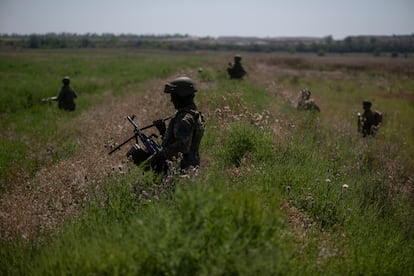Colombia, the world’s largest exporter of mercenaries: ‘We’re like soccer players. Headhunters look at your work and make you an offer’
Thousands of former military personnel are hired for large sums to fight in wars or to serve as private security abroad. The network behind this business is in the government’s sights

Yeison Sánchez was prepared to die when he set out on his journey to Ukraine. The 31-year-old retired Colombian army soldier had purchased repatriation insurance and warned his family of his possible fate in the war against the Russian invasion. His main motivation was money. He watched TikTok videos from fellow countrymen promising that as a volunteer for the Ukrainian army he would receive 19 million pesos (about $4,300) a month. So he saved up about $2,300 to take a flight from Bogotá to Madrid, another from there to Poland, and finally crossed into Ukraine by land to enlist in a foreign conflict.





Like Sánchez, who had worked as a security guard and a nurse over the past decade, the financial stimulus has pushed thousands of Colombians to go fight abroad, in countries like Ukraine or Sudan. Others prefer to work as bodyguards or security guards in the United Arab Emirates or Mexico. Their cases have several elements in common: they are former military personnel who retire at an early age and have little training for any activity other than combat. As veterans, they receive a small retirement salary from the Colombian state, which, by contrast, makes offers to earn up to five times more outside the country more attractive.
In Ukraine, Sánchez didn’t last long. He deserted after six months, partly because the actual pay was far below the $4,300 promised — “I felt cheated” — and partly because he felt mistreated by his superiors. “We were locked up. They would take us out at dawn to do push-ups as punishment for some of our colleagues speaking Spanish to the locals. That was forbidden. I told them we were volunteers, not hostages,” he says. With him, he says, went 40 soldiers from the international legion. Now he is considering various offers, such as going to Mexico to work with the cartels, or “the project” in Africa, “which is making a big splash at the moment.”
The interest in Colombians within the mercenary and security market is well justified. Colombia has one of the largest and best-trained militaries in the world. “They have been training under a counterinsurgency doctrine for 60 years, and they have actually fought. That is why they are so sought-after by foreign armies and private security companies,” explains Laura Lizarazo, a national security expert at the consultancy Control Risks. Since 2000, the presence of Colombian mercenaries has been reported in dozens of countries, including Russia, Yemen, Libya, Somalia, and Afghanistan.
The most notorious incident involving Colombian mercenaries was the assassination of Haitian President Jovenel Moïse in 2021. Seventeen Colombians remain in custody for the attack in Port-au-Prince. Several maintain that they were hired to kidnap the president, not kill him. Two of the leaders of the operation, planned in the United States, have been sentenced to life imprisonment by judges in Florida. The case of two volunteers in the Ukrainian army who have been detained in Russia, after having been extradited from Venezuela, has also been in the spotlight.
“We are like soccer players”
“The same thing happens with soccer players as with the military. Many headhunting companies come to Colombia to look at your work and make you an offer.” This is how Dante Hincapié, who was in the Navy for 21 years, describes the recruitment phase. Despite having reached the rank of chief petty officer, his retirement salary seemed insufficient. So in 2014 he got involved in the mercenary business and went to the United Arab Emirates as communications commander of an Emirati army battalion made up solely of Colombians. “We were about 2,000 men, the company Global Security Services Group (GSSG) sent about 30 soldiers a week,” he says.
Some time later, in 2018, he went to Yemen — “one of the most fucked up places I’ve ever been” — to escort European and U.S. ships crossing the Gulf of Aden that were frequently attacked by pirates. In three years as a paid soldier, he earned almost $70,000, while the sum of his savings and his retirement pay from the Navy barely amounted to $15,000.
Hincapié, 48, admits that some companies take advantage of ex-soldiers, and points to the cases of Sudan and Haiti, but he claims that this is not usual: “They never failed to comply with my contract. It is an outlet for many of the soldiers who retire.” For him, “the only person to blame for so many of them going abroad is the government. They are indolent, they don’t care about the soldiers.” And he is not afraid to be critical of the Colombian state, because he feels there is a persecution against the military: “We are not terrorists. Being a soldier is synonymous with gallantry.”
A complex business network
The rise of mercenaries, which has led to huge human losses (the Foreign Ministry estimates that 300 Colombians have died in the war in Ukraine), has pushed the government to promote a law to prohibit the activity completely, as it will outlaw organizations “that exploit retired military personnel,” in line with a UN convention created in 1989. Jovana Ranito, president of the United Nations working group on mercenaries, welcomes the promotion of this measure. “International legislation is the starting point, but if it is not implemented internally, it is very difficult to apply it to combat this phenomenon,” she says from Geneva.
For the expert, countries that join the treaty will help them to rein in the recruiting companies, the main player in this market. “There is a wide spectrum of companies that are registered in different countries and with different names, and it is therefore more difficult to track them.” The core of their operations are countries in the Global South, which are often experiencing a fragile economic situation and have emerged from a situation of conflict.
This business network has been home for more than a decade to Jaime Henao, a 40-year-old former sergeant in the Colombian army. He was trained by Blackwater — now called Academi, one of the largest private security companies in the world — and along with several dozen Colombians was assigned to Afghanistan in the midst of the war. There, Henao worked as a guard at the U.S. consulate in the city of Herat, the scene of a suicide attack by the Taliban in September 2013.
After his contract ended a few months after the attack, he returned to Colombia and continued in the private security business. In 2021, he received a call from the company A4SI, to work as a bodyguard in Abu Dhabi, the capital of the United Arab Emirates (UAE). “They offered me $2,300 in a contract with the company GSSG. There were eight of us Colombians and until the last moment, who I was going to take care of was kept a secret,” he says. His charge ended up being a former Afghan president who had taken refuge in the UAE.
A4SI was founded in 2017 by Omar Antonio Rodríguez Bedoya, a former officer in the Colombian army, but its operation is now led by Álvaro Quijano, a retired colonel from the same corps. This company is in the eye of the storm for having hired at least 300 Colombian mercenaries who were sent to Sudan to fight in the civil war. Many claim to have arrived under false pretenses, as they expected to be private security guards in the Emirates, such as Henao. The experts consulted indicate that this occurs with some regularity, since, once in another country, the recruits — without knowledge of the language and without their own money — are left entirely in the hands of these companies.
An endless cycle
Mercenary activity will not stop in the near future, predicts Alfonso Manzur, founder of Veterans for Colombia, an organization that sageguards the rights of retired military personnel. The expert says that thousands of Colombians have worked in this business and that it is becoming more and more difficult to make a general count due to the proliferation of recruitment in countries such as Ukraine and Mexico, where security companies do not intervene. “In the first decade of the 2000s, the number of mercenaries increased by some 250,000 men, many of whom are now retiring. That is why we have seen an explosion of Colombian mercenaries in the world in recent years,” he explains.







The complaint remains the same: retirement benefits are too low. But Manzur warns of another problem. “Governments have not taken adequate measures to help former military personnel adapt to civilian life. Many were poor people who found a livelihood in the war and, if they are not rehabilitated, they will continue in this industry.” The bill presented by the government contemplates creating reintegration programs for veterans and increasing their economic support.
Despite these measures, the three mercenaries interviewed — all of whom accept the term — admit that they prefer to remain in the market. Sánchez, back in Medellín, says that he will rest for a while, but that money “makes me move.” The plan that convinces him the most is to go to Mexico, because of its proximity to Colombia and because several of his colleagues are already there. Henao, for his part, moved to Libya to be a military instructor. Despite not being involved in direct confrontations, he earns up to $4,000. Hincapié has been retired for several years, but never far from the business, and says that he is now an activist for the rights of veterans. “One is a soldier from the moment he swears allegiance to the flag until the end of his days,” he says.
Sign up for our weekly newsletter to get more English-language news coverage from EL PAÍS USA Edition
